|
This month was heavy on the crime writing--I have two books of essays going, but they're both going slowly, and I'm not done with them yet. So with one exception, it's been all mystery all the time (and isn't that how summer reading is supposed to be--light and fun?).
The Exception Outer Order, Inner Calm by Gretchen Ruben. I like to have a small book with very short sections handy for when I have only a minute or two to read, and this month's selection was a reread, intended to help my through to the finish line on the whole-house cleaning and decluttering program I've got going this summer. There's some very helpful advice in this book (although, honestly, nothing that's not common sense, but it helps to have it stated clearly), and also a few things that don't really appeal to me. But since each suggestion is a page or less in length, each one is easy to digest and either adopt or disregard. Crime Fiction First, two more books that I picked up at the Crime Wave conference: Muddled Through by Barbara Ross and Death in a Blackout by Jessica Ellicott, both authors whose books I've read and enjoyed in the past. Muddled is part of the Clam Bake series, which take place in a Boothbay-Harbor-esque coastal Maine town and are culinary cozies, and Blackout is the debut of a new series by Ellicott, about a young woman who becomes a police constable in England during World War II. Both fun and engaging reads with classic whodunit structures and great twists at the end. After the conference, I decided I needed to familiarize myself with more Maine crime writers, and picked up two more books at the local book shop: Body Double by Tess Gerritsen and The Poacher's Son by Paul Doiron. Both authors I have known about for many years, but I've avoided Gerritsen's books because I figured they'd be more gruesome than I what I normally care to read (one of her protagonists is a medical examiner). And I figured Doiron's books would be all about huntin' and fishin', since his protagonist is a game warden. Body Double, while excellent, did verge on too gruesome, although the details of the autopsies and bodies didn't necessarily bother me; it was more the psychopathic killers, their choices of victims, and their motivations that turned my stomach. I prefer a nice, tidy poisoning or strangulation for a good, solid reason (inheritance, revenge, jealousy, etc.), and a bit of humor or the ridiculous to lighten the mood. Doiron's book did have just enough humor in it to leaven the heavy story, and while there was plenty of huntin' and fishin', the protagonist proved to be a nuanced and sensitive character. And I love me a protracted, multi-peak climax in a story, and this one had a small mountain range. So I'll be reading more. From the used bookshop, I picked up The Tuscan Child, by Rhys Bowen, which was in the mystery section (and her other books appear to be mysteries), and it was set up like a thriller, but there wasn't much of a twist with regard to whodunit, the suspense wasn't super intense, and the climax was brief. Still, it was an interesting story, with a double timeline of late-WWII and 1973, in a setting of Tuscany (though I would have preferred more details about the countryside and fewer about the food). From the $2 bookshelf at said bookshop, I grabbed Larkspur by Sheila Simonsen, a classic whodunit published in the early 1990s. I'd never heard of this author before, but I liked her main character, her voice, and her style. (Humor, people! It's the perfect complement to murder!) And from the 50 cent shelf I picked up The Piper on the Mountain by Ellis Peters. I've read a number of Peters's Brother Cadfael murder mysteries, but I think only one of her contemporary (1960s) books. This one was a combo spy thriller/murder mystery and it is a masterclass in the buildup of suspense and in the protracted climax. Really stellar. It is interesting, though, to note how much outside of the characters the narration often was at that time, while now we want to be right in there with the protagonist. (It takes over half the book to realize who the protagonist is going to be!). That's it for July--a summer of murder and mayhem. Now I will be toning it down as I read in anticipation of a trip we'll be taking next month. More on that in August's post!
0 Comments
I've had two pieces appear in magazines this summer. The first is an essay called "At Home in the Trees" about the summer I lived in a treehouse. You can find it in the "A Place in Mind" department on the last page of the Summer 2024 issue of Northern Woodlands Magazine.
The second is an article called "Discover Maine's Undersea World" about all the many places in the state you can go to learn more about the Gulf of Maine, from touch tanks at children's museums to informal ocean science talks at local breweries. You can find it in the Summer 2024 issue of Green & Healthy Maine. Lately I've been trying to come to terms with my writerly split personality--nature writer and crime writer--but looking at this month's list (and probably every reading list I've made for the last ten years), I see that it comes directly from having a readerly split personality (nature writing and crime writing)--duh! And no more than I'd give up reading one kind of book should I consider giving up writing one kind of book. So that's settled!
Nonfiction I've been trying to be better about reading books that other people loan or give to me right away rather than let them gather dust on the shelf for a few years before I get around to it. Owls of the Eastern Ice by Jonathan Slaght is one that a friend passed on to me sometime this winter, and I finally sat myself down to read it this month, and I'm glad I did! It tells the story of the author's several years (5 or 6) doing field work in eastern Russia to find, study, and protect the population of Blakiston's fish owls that make their home in the far eastern part of that country. Slaght depicts many harrowing adventures (snowmobiling over rivers on which the ice is ready to break up, nearly becoming plowed into a logging road, sitting up all night in the freezing cold waiting for owls to set off a trap, trying to keep up with Russians drinking), and his descriptions of the owls and his encounters with them are wonderfully rendered. He also succeeds in his research, developing a realistic conservation plan for these rare and fantastical creatures. For several months, I've been reading little snippets of Sibley's Birding Basics by David Allen Sibley, in an effort to improve my birding skills. It's an interesting book, but there is nothing basic about it--a better title perhaps would be Sibley's Deep Dive into Esoteric Aspects of Bird Morphology--but it was still a worthwhile read, and though I don't feel any more well-equipped to discern the molt phases of any particular bird species than I was before (nor do I necessarily feel any more compelled to), I at least know that there are different molt strategies among different groups of species. Fiction A River Runs through It by Norman Maclean. I list this under fiction, because he calls the collection a novella and short stories, but I wonder how it would be classified if he were writing today. (Something like David Sedaris's "true-ish" stories?) It's a book that I have known about since forever, of course, without ever giving it much thought, except that I attended a seminar once in which the speaker claimed that it's the best horror story ever written, which I found intriguing (since it's obviously not horror). I picked it up recently for a dollar or two at a used bookstore and brought it with on our camping trip last month to read to the boys, if they'd let me. As it turned out, I was at the tail end of a cold, and kept coughing as I tried to read out loud, and they didn't have the patience for Maclean's very drawn out descriptions of fly fishing, so after the first night they declined to hear more and had me read instead from a collection of Grimm's Fairy Tales that E had brought along. I, on the other hand, was totally drawn in by Maclean's writing, despite having less than zero interest in fly fishing (and even less in other kinds of fishing), and now I see what that speaker meant--Maclean had an absolute gift of building up suspense, not only in ARRTI but also in the shorter stories in the collection, and I need to go back and reread them see how he did it. The Road to Dalton by Shannon Bowring. I picked this book up at a reading I attended last summer that a couple of friends of mine were also a part of, and it won the Maine Book Award for last year. The story follows many characters (there must be 5-10 different points of view) through about a year in the early 90s in Aroostook County, Maine, showing their various challenges and prejudices and heartaches. If She Wakes by Michael Koryta. Koryta was awarded Crime Master at the Maine Crime Wave conference, which I attended a couple of weeks ago. I wasn't familiar with his work before, but picked up this novel, which is one of a few that take place in Maine. This book also has several point of view characters, which isn't my favorite form, but he pulled it off very well. One of the POV characters is in a coma, which was a fascinating thing to attempt--successfully, I might add--and two others were assassins. And, despite the assassins and several not-very-nice individuals in the book, he manages to keep it light with a fair dose of humor, and despite these two killing a lot of people, it didn't come across as grotesque or gratuitously violent, for the most part. I will definitely read more of his books in the future. The Ebony Swan by Phyllis A. Whitney. I picked this book up at a used bookstore some time ago, because Whitney provided blurbs on pretty much every Barbara Michaels book, and I've been craving more old-school suspense. I have to admit (and I'm sure Ms. Whitney won't mind, being deceased and also extraordinarily successful before she died) that I found it pretty dull. I read the first couple of chapters and set it aside for months before forcing myself to pick it up again. It moves very slowly, the voices used for the two POV characters are indistinguishable and extremely emotionally distanced from the reader, the suspense build up is very subtle, and the crisis/climax is quick and not very thrilling. I did get engaged with the story about 1/2 to 1/3 of the way through, but it was a slog to stick it out that long. But props to PAW for still writing when she was almost 90. I might look for a much earlier book by her, to see if it's any more exciting. After I retired my old blog at the end of last year, I thought I was done with writing a monthly synopsis of what I've been reading, but I guess I just can't quit! For the last couple of months, I tried squeezing it into my newsletter, but there just wasn't room. So now I'm back to blogging about books! Here's what I read in May: Fiction I'm still on my mystery/crime kick, and read a pretty broad range this month:
Multigenre
Nonfiction
You may or may not be aware that I have a split writing personality, applying my pen to both nature nonfiction and mystery fiction. Today's news is about the latter: I'm thrilled to announce that my short story, "The Rest of the Story," has been selected for third place in the CrimeFlash Fiction Contest for the 2024 Maine Crime Wave crime writing conference. I, along with the winner and other finalists, will be reading my story during the opening evening of the conference, An Evening of Crime (Writing)! This part of the event, to be held on June 14th, starting at 5 p.m., is free and open to the public.
Have you discovered the Shepherd book recommendation site yet? There you can find curated lists of books recommended by authors in an astonishing range of categories: mystery novels with a strong sense of place; books about women who went on adventures and changed their lives; detective novels that keep you laughing. If there's a very specific kind of book you love to read, there is probably a list on the site to match! I was invited to put together a list of books that shared something in common with my book, Uphill Both Ways, and I came up with the category of "the best books about women in the wild." It was fun and challenging to narrow it down to five books--I ended up choosing four that have been pivotal in my development as a reader, a writer, and a person, plus one that I only read recently but which I think will prove to be equally life-changing. You can check out my list and why I chose each of the books here.
Last fall I taught a workshop called Starting with Place for the Waterville Writes series held through Waterville Creates at the lovely new arts center in downtown. My workshop was about grounding a piece of writing (fiction, nonfiction, or poetry) in the location where it takes place. Because our workshop was held indoors after dark, we used photos I took of the area around Waterville's River Walk and Ticonic Bridge, and, using all of our senses, our previous knowledge, and our imaginations we generated writing about this spot in the heart of downtown.
Participants of this and the other three workshops were invited to submit writing begun during or inspired by any one of the workshops to be published in a chapbook. My flash fiction story "Two Cent Bridge" is included in the collection. The chapbook is coming out in May and will be launched at the Writing Waterville Workshops Story Share and Launch Party to be held on Sunday May 5th from 4:30 to 6:00 p.m. at the Paul J. Schupf Art Center on Main Street in Waterville. The event is free and open to the public, and refreshments will be provided. I'd love to see you there! Thanks to the efforts of a good friend, Uphill Both Ways is now available in a large print edition, which you can order directly from the publisher, Center Point Large Print. It's really fun to see my words in such big letters!
Like many writers, I love to talk and write about writing as much as I like to actually write, so I was delighted to contribute a post to the Literary Mama blog series about writing my essay "Fledging Season" for Labor of Love: A Literary Mama Staff Anthology. In the post, I share a bit about how and why I turn to nature for inspiration in both parenting and writing. You can read it here.
I had a wonderful time talking to Brianna Avenia-Tapper of the Writing Stories Podcast about the ups and downs of writing Uphill Both Ways and getting it out into the world. You can listen to the episode here or on your favorite pod player app.
|
Archives
July 2024
Categories
All
Copyright © 2017
Andrea E. Lani. All rights reserved. |








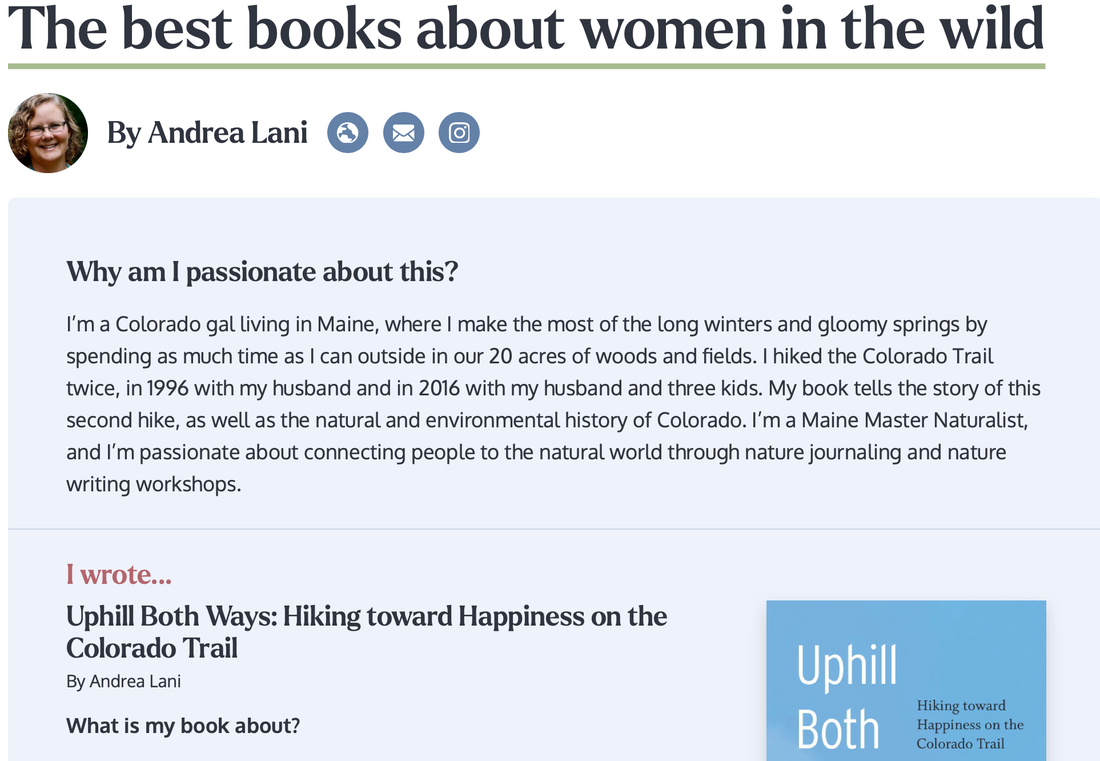

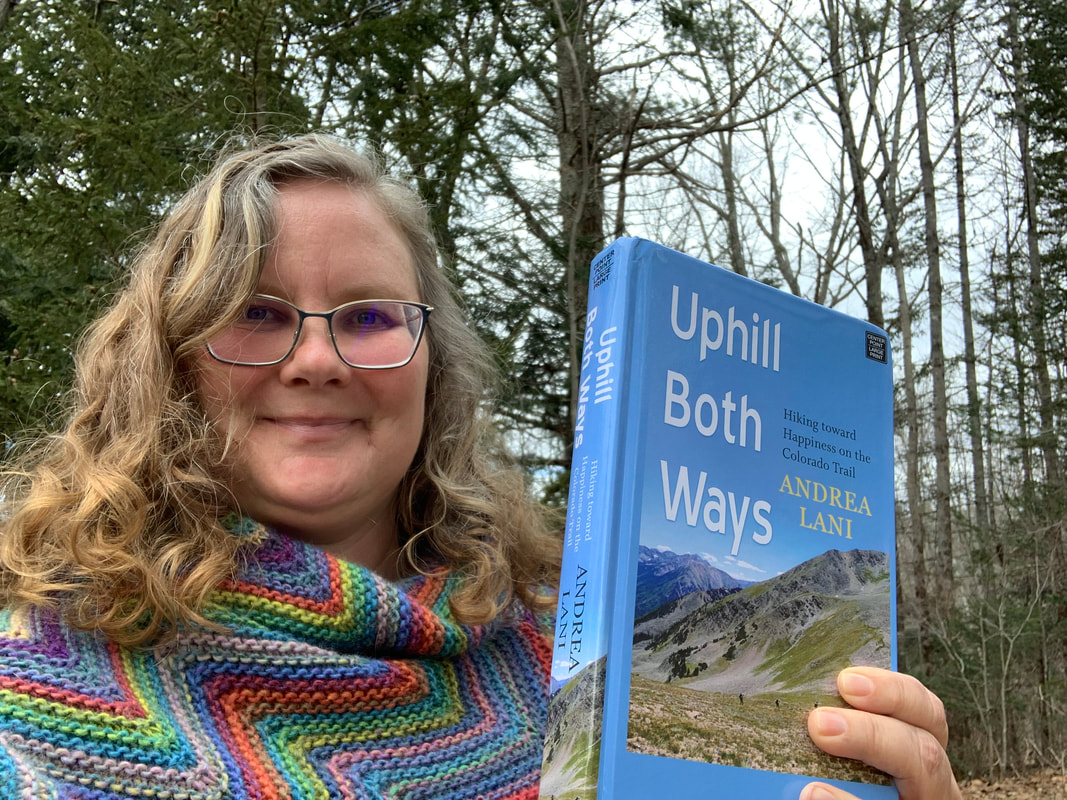
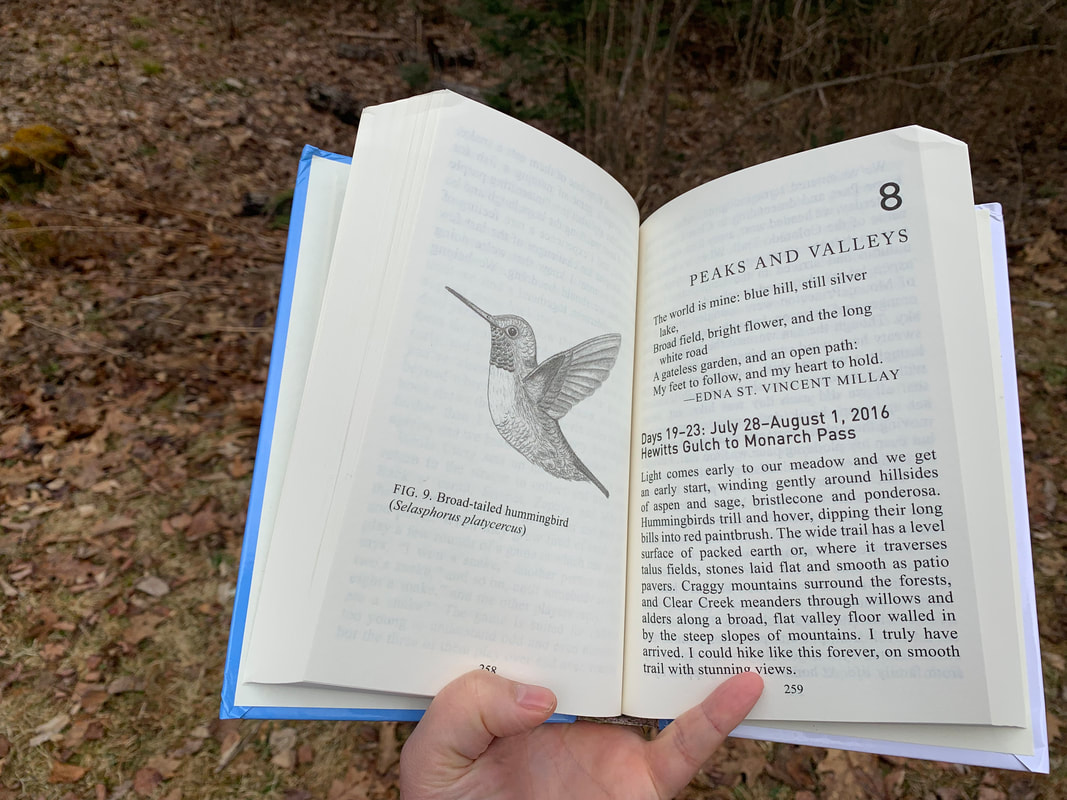
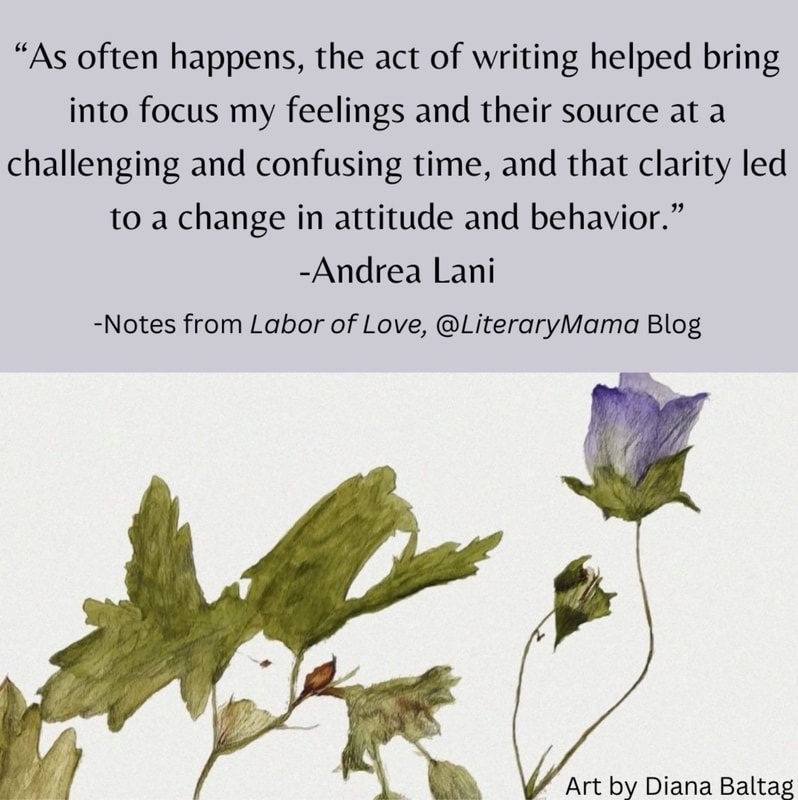
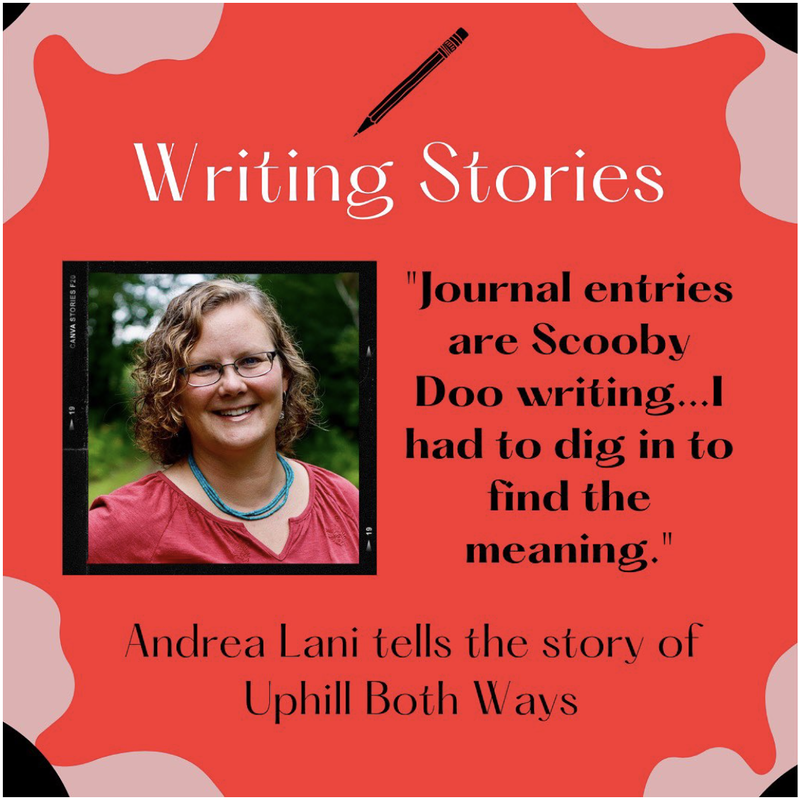
 RSS Feed
RSS Feed